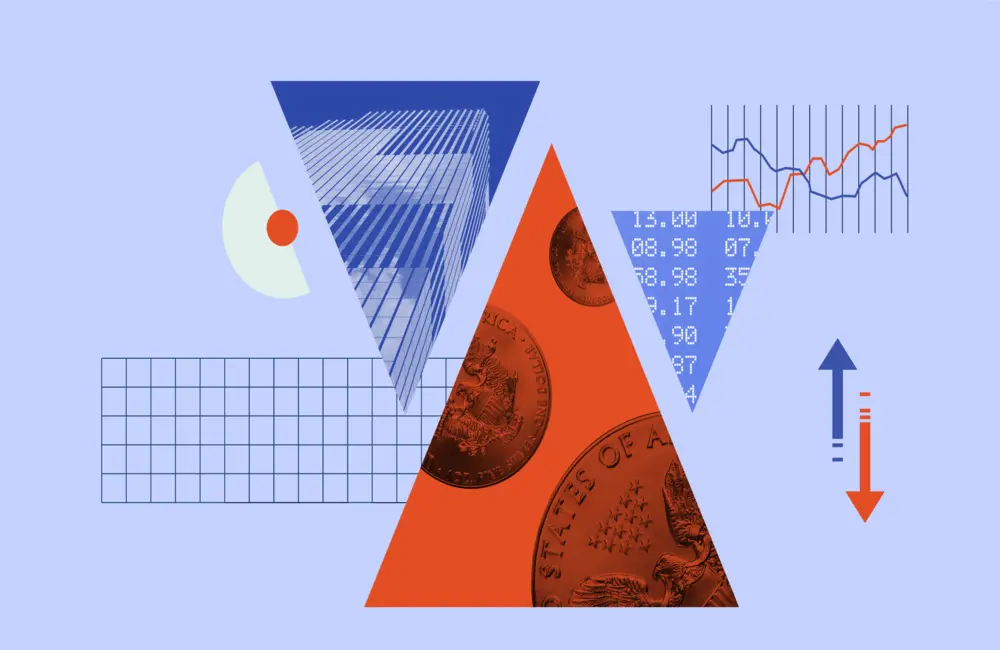ASX futures fell 62 points or 0.9 per cent to 7183 near 8.00 am AEST, indicating a weak start to trade.
US stocks slumped Thursday afternoon, surrendering the morning’s gains and revealing that investors are still spooked by the prospects of tightening monetary policy and slowing growth.
The Nasdaq Composite Index fell 1.3%, a day after a late-day tech pullback weighed on indexes. The index had risen nearly 2 percent earlier in the day. The S&P 500 fell 1.1 percent, and the blue-chip Dow Jones Industrial Average lost 0.9 percent.
The back-and-forth trading is a sign investors are trying to figure out how deep this selloff will be. On Wednesday, the uneven, weekslong selloff knocked the Nasdaq down more than 10 percent below its last record closing, dropping it into correction territory. Those sorts of plateaus typically lure in bargain hunters, but on their own aren’t a sign that a selloff is done, observers say.
In local trade, the S&P/ASX 200 advanced 0.1% to 7342.4, with materials leading by a distance, rising 3.0%.
And some leading blue-chip stocks in the heavyweight financial sector held back the benchmark index. CBA was down 0.7%, NAB lost 1.3% and Macquarie dipped 0.6%.
Superstar of the day Northern Star Resources flew up 11.2pc after it told investors it was on course for FY 2022 output. Evolution Mining gained 8.9% and Silver Lake Resources added 7.0%.
Energy companies gained on a flurry of trading reports. Santos gained 0.8% after it said on Monday it achieved record output of oil and natural gas in 2021. Woodside finished up 1.5% after providing record Q4 revenue due to rising oil and gas prices.
Shareholders in London and Sydney of BHP voted in the “overwhelming” interest to unify the services of the miner’s dual listing. The results were revealed overnight AEST. Shares had closed Thursday up 3.1%.
Overseas, Chinese stocks listed in Hong Kong soared after an interest-rate cut by China’s central bank boosted shares of property developers and tech giants. The Hang Seng Index was up 3.4% while mainland China’s Shanghai Composite Index eased 0.1%. The Nikkei 225 also surged, up 1.1% in other Asia. The pan-continental Stoxx Europe 600 was up 0.5 percent.
On the commodities front, gold futures fell 0.3% to $US 1840.90 a barrel; Brent crude lost 1.2% to $US 87.39, close to a seven-year high; Iron ore extended its climb, gaining 2.6% to US$133.65 a tonne.
Bond markets were steadier following days of selling, with the yield on the Australian 10-year bond unchanged at 1.99%, while the benchmark US 10-year Treasury yield eased to 1.81%.
The AUD was 72.21 US cents in the vicinity of 8:00 am AEST, a rise from the previous close of 72.08. The WSJ Dollar Index, which compares the US dollar to 16 other currencies, climbed to 89.52.
Asia
Chinese stocks fell, though the country’s central bank cut benchmark lending rates for a second month in a row, trying to prop up the economy as it faces a new wave of coronavirus cases. Beijing’s monetary support may have been offset by concerns over tighter US monetary policies, according to KGI Securities. The benchmark Shanghai Composite Index retreated 0.1%, and the Shenzhen Composite Index lost 0.9%. The ChiNext Price Index, a gauge of emerging industries, decreased 0.3%. Solar companies were among the big losers in the session with expectations of below-target 4Q earnings amid high energy and raw-material costs.
Hong Kong’s technology stocks ended with sharp gains Thursday, buoyed by Beijing’s continued efforts to ease monetary policy and improve sentiment toward growth sectors. The benchmark Hang Seng TECH Index gained 4.5%, reaching its highest closing level in more than a month. UOB Kay Hian internet analyst Chun Sung Oong said today’s rally was probably due to China’s decision to lower its benchmark lending rate for the second straight month. He also cited relatively decent valuations of the sector, after the Hang Seng TECH Index retreated 12% over the previous three months. Meituan surged 11%, Alibaba Health climbed 7.6% and Tencent gained 6.6%.
Japanese stocks ended higher, with electronics stocks bringing in most of the gains as selloffs on Wednesday sparked some bargain-hunting. Sony Group rose 5.8%, after sliding 13% on Wednesday on worries that the merger would give new competition to its videogame business. Olympus rose 3.6% and NEC Corp. added 2.8%. The Nikkei Stock Average gained 1.1%. Any US economic data, including weekly jobless claims set to be released later in the day, would be closely eyed for an indication of the speed of the Fed’s potential increases.
Europe
European shares edge higher after a strong start to trading on Wall Street.
European markets opened the day on the back foot after a big sell-off in Asia markets, CMC Markets analyst Michael Hewson says. “But by the end of play all the early losses have evaporated, courtesy of a number of decent trading updates and a rally in the basic-resources stocks, boosted by climbing metal-prices.”
In London, the FTSE 100 slid 0.06 percent and for a second day, the legion of banks, miners and oil stocks that make up the index’s big hitters lost ground. BHP's UK and Australian shareholders voted with overwhelming approval to unify the miner’s listings onto the Australian Stock Exchange.
“Traders are reorienting their trades today, reentering growth stocks after the recent selloff and closing out their profits in the FTSE 100, after a strong run for that index,” says Chris Beauchamp, chief market analyst at IG Group.
North America
US stocks weakened late Thursday, surrendering the morning’s gains and underscoring that investors remained rattled about the prospects of tightening monetary policy and waning growth.
The Nasdaq Composite Index declined 1.3 percent, a day after a late selloff in tech weighed on indexes. The index was up nearly 2 percent earlier in the day. The S&P 500 declined 1.1 percent, and the blue-chip Dow Jones Industrial Average was down 0.9 percent.
The choppy trading indicates that investors are trying to figure out how deep this selloff will be. On Wednesday, the drawn-out, weekslong selloff left the Nasdaq down more than 10 percent below its record close, placing it in correction territory. Such plateaus typically attract bargain hunters, but are in themselves no indication that a selloff is over, observers say.
“Anytime we see equities on the treadmill to nowhere, as they have been this year, we know that the likelihood for a sale at some point in the future only increases, not decreases,” said Nicholas Colas, the founder of the analytics firm DataTrek Research.
In the face of multiple interest-rate increases, cooling growth and inflation at multi decade highs, investors have been reevaluating the pandemic-era playbook that emphasized outsized returns in growth stocks like those in technology. In recent sessions, investors rotated into sectors that are on track to do better in the coming year, like financials and energy.
Investors are selling government bonds on the expectation that interest rates will rise, which is sending yields higher and, in turn, putting pressure on tech companies, whose future earnings become less appealing when compared with bonds with higher yields.
“I don’t see a ton in the marketplace that is actually scaring me. Nobody is out there saying ‘run for the hills,’ but there are people saying they’re going to take off risk and that they’re going to reposition to other areas of the market,” said Kara Murphy, chief investment officer of Kestra Holdings.
The day also delivered a slew of economics reports. Weekly jobless claims rose to 286,000 from 231,000 as businesses grapple with Omicron-related disruptions. December existing-home sales fell 7.1% year-over-year, but home sales for 2021 achieved a 15-year high.
The yield on the 10-year US Treasury note fell to 1.81%, giving back some of the gains it has made in recent weeks. Benchmark German bund yields dipped further into negative territory, a day after they spent a moment above zero. The yield on the 10-year German government bond fell to minus 0.015% Thursday from minus 0.014% Wednesday.
US equities are not doing much, with shares of Peloton Interactive down 20% after CNBC said the company is suspending production of its bikes and other connected-fitness products on weaker consumer demand.
Dow component Travelers Cos. jumped 4.8% after posting record net income in the fourth quarter, and reached an intraday record. American Airlines Group dropped 1.2% even after the carrier reported that it had reduced its losses.
Netflix will be one of the first big tech companies to post its fourth-quarter results, after markets close, along with PPG Industries.























